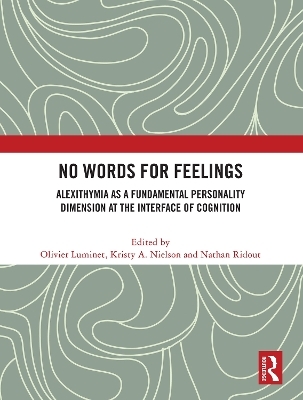
No Words for Feelings
Routledge (Verlag)
978-1-032-73133-9 (ISBN)
This book shows that the facets of alexithymia influence several aspects of how one perceives and responds to neutral and emotional situations, by impacting multiple cognitive processes (attention, appraisals, memory, language and behavior). The effects are influenced by context, with some situations leading to deficits in emotion responding, and others that contribute to emotional over-responding. The book shows the importance of drawing better connections amongst multiple processes, toward disentangling them and revealing where early processes have impacts on later processes. A lack of correspondence between processes, as well as amongst alexithymia facets is expected to lead to ineffective and inflexible emotion regulation, thereby posing elevated risks for physical and mental illness.
The chapters in this book were originally published as a special issue of Cognition and Emotion.
Olivier Luminet is Full Professor at UCLouvain and Research Director at the Belgian Fund for Scientific Research (FRS-FNRS). His main areas of interest include interactions between emotion, personality and health and the links between emotion, identity and memories (both at the individual and at the collective levels). He has published more than 50 papers on alexithymia in international journals, and a co-edited book Alexithymia: Advances in Research, Theory, and Clinical Practice (2018). He is the co-editor of Flashbulb memories: New challenges and future perspectives (Routledge 2017). Kristy Nielson is Full Professor at Marquette University, Milwaukee, USA. She is a cognitive neuroscientist and neuropsychologist whose research targets the neural substrates underlying memory, executive functioning, and sensorimotor changes in aging and Alzheimer’s disease; genetic influences on these neural substrates; the role of individual differences, such as sex, sexual orientation, and emotion processing (specifically alexithymia) on cognition and “successful aging”; early biomarkers predicting cognitive decline; and interventions, such as exercise, for preventing, reducing, and adapting to cognitive decline. Nathan Ridout is Senior Lecturer at Aston University, Birmingham, UK. He is experimental psychologist and the primary aim of his research is to understand cognitive and affective changes associated with psychopathology, most notably depression and eating disorders. His areas of interest are memory (especially autobiographical memory) and social cognition (especially processing of facial emotion). Other areas of expertise include: alexithymia (particularly in association with psychopathology, and influence on emotion processing) and cognitive changes observed in older adults.
Introduction: Having no words for feelings: alexithymia as a fundamental personality dimension at the interface of cognition and emotion 1. Cognitive-emotional processing in alexithymia: an integrative review 2. Adaptive and maladaptive emotion processing and regulation, and the case of alexithymia 3. Negative valence specific deficits in judgements of musical affective quality in alexithymia 4. Alexithymia and reaching group consensus 5. The role of alexithymia in memory and executive functioning across the lifespan 6. The influence of alexithymia on memory for emotional faces and realistic social interactions 7. Alexithymia disrupts verbal short-term memory 8. Alexithymic traits predict the speed of classifying non-literal statements using nonverbal cues 9. Getting lost in a story: how narrative engagement emerges from narrative perspective and individual differences in alexithymia
| Erscheinungsdatum | 10.07.2024 |
|---|---|
| Verlagsort | London |
| Sprache | englisch |
| Maße | 189 x 246 mm |
| Gewicht | 470 g |
| Themenwelt | Geisteswissenschaften ► Psychologie ► Allgemeine Psychologie |
| Geisteswissenschaften ► Psychologie ► Biopsychologie / Neurowissenschaften | |
| Geisteswissenschaften ► Psychologie ► Entwicklungspsychologie | |
| Geisteswissenschaften ► Psychologie ► Verhaltenstherapie | |
| Medizin / Pharmazie ► Medizinische Fachgebiete ► Psychiatrie / Psychotherapie | |
| ISBN-10 | 1-032-73133-8 / 1032731338 |
| ISBN-13 | 978-1-032-73133-9 / 9781032731339 |
| Zustand | Neuware |
| Informationen gemäß Produktsicherheitsverordnung (GPSR) | |
| Haben Sie eine Frage zum Produkt? |
aus dem Bereich


